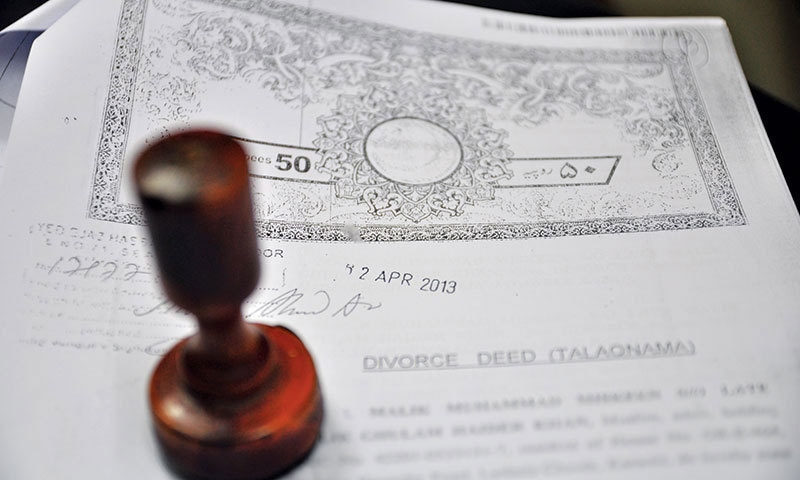Talaq or Khula are two methods for dissolving a marriage. Information in general A Muslim marriage is a contract that, like any other contract, can be dissolved. When one of the spouses dies, the marriage is instantly dissolved. Aside from that, both the wife and the husband have legal and religious rights to divorce. A husband’s unilateral power to talaq cannot be taken away, but it can be limited by the nikahnama. Only if the husband has unequivocally assigned the power to divorce from her in the nikahnama can a female unilaterally dissolve her marriage.
Khula and judicial divorce are two other types of divorce that the woman can use (including option of puberty). Both of these must be obtained through the Family Courts.
No matter whether the marriage has been dissolved through talaq, khula, or judicial divorce, it is vital that legal procedures be properly followed. Failure to do so can raise doubts about the effectiveness of the divorce and lead to serious legal problems, such as a case of bigamy and zina against a woman who later remarries, or difficulties in settling issues related to the divorce such as past maintenance or claiming deferred haq mehr. The paternity of children can also be disputed.
In addition to any court decree, the woman must make sure she collects her talaqnama certificate from the Union Council and keep it somewhere safe.
Talaq is a term that refers to a (Divorce)
According to Muslim Personal Law and Section 7 of the Muslim Family Law Ordinance, the husband declares talaq (orally or by Deed of Divorce) and sends a written notice to the Union Council, giving his ex-address. wife’s Following that, the responsible union Council delivers a copy of the notice to the wife via registered mail and forms an arbitration council within 30 days of receiving the notice. The union council will issue a certificate of Talaq being effective to the husband and wife once the iddat period (90 days from the date the union council receives the talaq notice) has passed.
Please keep in mind that talaq does not take effect until the iddat period has expired, and failure to follow the law can result in simple imprisonment of up to one year and/or a fine of up to Rs. 5000/-. The Importance of a Registered Talaq Notice
A verbal talaq is illegal, and the husband’s inability to notify the Union Council in writing renders the talaq ineffective. Even if the Union Council grants a certificate of talaq, the talaq might be contested if the wife was not properly served with notice.
This law was created to safeguard women against an unrecorded and immediate divorce. Prior to 1979, when the Zina Ordinance was enacted, a woman who had not been lawfully divorced and afterwards remarried might be sentenced to up to 7 years in prison for bigamy (or up to 10 years if she disguised the prior marriage), and only on the complaint of her first husband. Since 1979, however, bigamy has made a woman subject to zina accusations, which can entail a very severe penalty, including death. As a result, a woman’s marital status must be very obvious, and she must have official confirmation that she is legally divorced.
A wife’s father, mother, adult brother or sister – but no other relatives – can give notice of talaq on her (with the Union Council’s agreement). If this is not possible because her whereabouts are unknown and notice cannot be served on her through her immediate relatives, the husband may nonetheless serve notice through a Union Council-approved newspaper.
Families sometimes make the mistake of refusing to receive a registered notification because they believe it is a talaq notice. This is risky since the talaq will be effective if notification is given through the newspaper, but the lady will be uninformed of her status.
Mubarat and Talaq-i-Tafweez (Mutual Divorce)
There is no need to go to court in either of these types of divorce, thus the marriage can be ended quickly, cheaply, and with minimal procedural issues. In this case, both husband and wife may sign a Mutual Divorce Deed and send a written notice to the concerned union council under section 8 of the Muslim Family Law Ordinance. The Union Council will follow the same procedure as a regular talaq announcement.
If, on the other hand, the wife is granted the right to divorce in her nikahnama (clause 18), she is entitled under the law to follow the same talaq procedure as a husband.
Khula (Divorce by Wife through Court)
If the wife’s nikahnama does not grant her the right to divorce, she will need to petition for Khula. The dissolution of marriage initiated by the wife and granted by the court is known as khula, which literally means “untying the knot.” To apply for Khula, the wife must file a suit in the Family Court under the West Pakistan Family Courts Ordinance, claiming that she can no longer live with her husband “within the limits prescribed by Allah,” and that such a statement on oath made in her suit would be sufficient to prove her case for Khula.
Grounds for Judicial Divorce
Grounds on which a woman may seek khula include:
• Desertion by husband for four years,
• Failure to maintain for two years
• Husband contracting a polygamous marriage in contravention of established legal procedures,
• Husband’s imprisonment for seven years,
• Husband’s failure to perform marital obligations for three years,
• Husband’s continued impotence from the time of the marriage
• Husband’s insanity for two years or his serious illness
• Wife’s exercise of her option of puberty if she was contracted into marriage by any guardian before the age of 16 and repudiates the marriage before the age of 18 (as long as the marriage was not consummated)
• Husband’s cruelty (including physical or other mistreatment, uneven treatment of co-wives), or any other reason recognized as admissible under Muslim law for the dissolution of marriage
Once the iddat time of the khula is finished, the Family Court will issue a decree and notify the Union Council, which will act as if it had received the notice of Talaq.
When a Khula suit is filed, the wife is usually required to return haq mehr and other benefits received from the husband as zar-ikhula; gifts received from the husband’s family are not required to be returned. The court determines how much and what is to be returned based on the facts of the case. The wife’s failure to pay zar-i-khula does not render the khula ineffective; the husband must file a separate suit for Zar-i-Khula







Leave A Comment